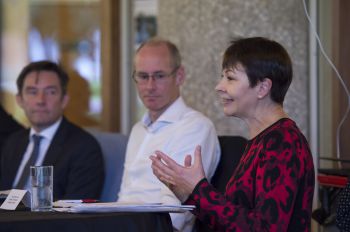How going greener can make Sussex a "beacon of best practice"
By: Jacqui Bealing
Last updated: Wednesday, 1 August 2018

Creating a greener and more sustainable society is as much about changing the mindset of people as it is about directly addressing environmental objectives.
This was the message from Caroline Lucas, MP for Brighton Pavilion and joint leader of the Green Party, at a special event to mark the University of Sussex’s new initiative to become one of the most environmentally friendly higher education institutions in the UK.
Speaking after switching on a system of 3,000 solar panels fitted to campus buildings, she praised Sussex for its Go Greener project and said it now had the opportunity to be a “beacon of best practice” for organisations looking to improve their sustainability, not just through technical innovations but also by considering factors such as ethical investment and workers' rights.
She was joined by Professor of International Relations Jan Selby, Sussex Energy Group’s co-director Dr Florian Kern, Sussex’s Director of Estates and Facilities Simon Neale, and Director of the Sussex Sustainability Research Programme Professor Joseph Alcamo for a debate chaired by Sussex alum and editor of Carbon Brief Leo Hickman.
While the discussion ranged from global to local issues, the panel was in agreement that Sussex, which has the largest solar project of its kind in UK higher education, was in a position to lead by example.
Mr Neale pointed out that Sussex had reduced its carbon emissions by 17 percent since 2005, despite the fact that the University had grown in size and population.
And although the Higher Education Funding Council for England (HEFCE) had set the University a target to cut its emissions by 43 per cent, he was confident that it could go beyond this to 45 per cent by 2020.
The £1.5-million project is the first key milestone in Sussex’s environmental initiative, which will also see the University replacing 27,000 light bulbs with more efficient LED lights, improving its heating and cooling systems and installing smart meters across campus. It will also be looking to replace current energy systems with more sustainable alternatives.
Professor Selby acknowledged the role of Vice-Chancellor Adam Tickell in pushing forward the solar panel project. But he also argued that a broader culture shift was required.
“Universities should be laboratories for social change,” he said. “We shouldn’t just be places where we conduct research outside, but where our practices are compatible with what we are teaching and studying.”
Dr Kern also welcomed the senior management’s buy-in to making the campus more energy efficient, and advised that, on the academic side, there were many more Masters programmes and undergraduate elective courses that now focussed on sustainable development, aid policy and energy transition.
Professor Alcamo, former chief scientist for the United Nations' Environmental Programme, added: “I see a great potential for trying out some novel and innovative ideas for sustainability on campus and I would welcome over the coming years a serious sustainable development plan for the university.”
As for global issues, Leo Hickman pointed out that US president Donald Trump, who has stated his intention to withdraw from the Paris Agreement, may be good news for climate change. “To mobilise the world, you need a big bad figure, and he is that figure.”
Professor Alcamo pointed out that he was surprised that Trump as a businessman had overlooked the fact that reducing greenhouse gas emissions was big business. “Eight million people are employed in energy renewable industries and the number is going to go through the roof.”
But the UK was also “vague” in its commitment to energy efficiency, said Caroline Lucas. “What we should be doing is insulating every single building in the UK. This would get our emissions down, create jobs and tackle fuel poverty.”
Professor Selby, who is involved in a Research Councils UK project looking at energy demand and the role of government policies, doubted the UK’s ability to turn policy into action.
“Climate change is going to have all kinds of long-term political and social consequences,” he said. “It requires integrated polices, with cross-departmental work. But we have had seven or eight years of austerity and jobs in sustainability have been lost across government.”
-----
The University of Sussex is home to the Sussex Sustainability Research Programme (SSRP), which is undertaking research into all aspects of the United Nations Sustainable Development Goals (SDGs), including environmental aspects.
